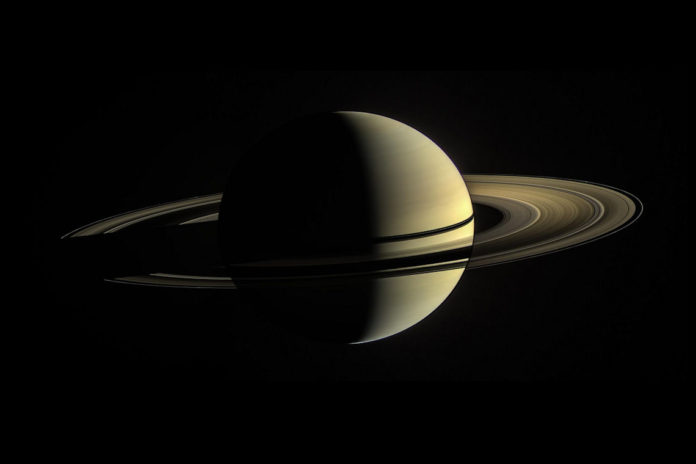Saturn is best known for its prominent rings. It lies in the outer half of the solar system. And, it is the sixth planet from the sun. This ringed planet is also the second largest planet in our star system. Like Jupiter, Saturn is a gas giant. The name of the planet comes from the Roman god of agriculture. The planet has at least 82 known satellites.
Features of Saturn
Planet Structure: Saturn is one of two gas giants in our solar system. The planet’s atmosphere is mostly hydrogen (96%) and helium (3%) gases. However, near the planet’s core, the pressures and temperatures are very high. Under these extreme conditions, gases begin to behave like a metal. As a result, a layer of metallic hydrogen surrounds the planet’s core. The core of the planet is thought to be iron and nickel.
Atmosphere: About once a year, a Great White Spot develops on the planet’s surface. The spot is a storm system. Saturn’s Spot is similar to Jupiter’s Red Spot. Wind speeds can reach 1,800 kilometers per hour in this gigantic storm.
Planetary Rings: Saturn has the most prominent rings of the four gas giants. One theory suggests that the rings are from a destroyed moon. Another theory believes that the rings are from the original materials that created Saturn.
Satellites: The ringed planet has 82 satellites with about 100 smaller moonlets. Titan is the largest moon. This is followed by Rhea, the second largest moon. The moon Enceladus may have an ocean that could support microbial organisms.
Facts About Saturn
| PROPERTIES | MEASUREMENTS |
|---|---|
| Distance from the sun | 1,513 million kilometers (aphelion), 1,353 million kilometers (perihelion). |
| Size | radius of 58.2 thousand kilometers. |
| Mass | 95 times that of earth. |
| Gravity | 106% of earth. |
| Satellites | 82 satellites. |
| Rotation | 10.5 hours (length of a day). |
| Revolution | 10,759 days (time to orbit the sun). |
| Surface Temperatures | 134 °K. |
Reflections
Vocabulary
- atmosphere
- core
- gas giant
Notes
- Saturn is the sixth planet from the sun and a gas giant.
- Saturn is well known for it planetary rings
- Water is thought to be found on some of its moons that could support simple life forms.

